August 2020 NEWSLETTER
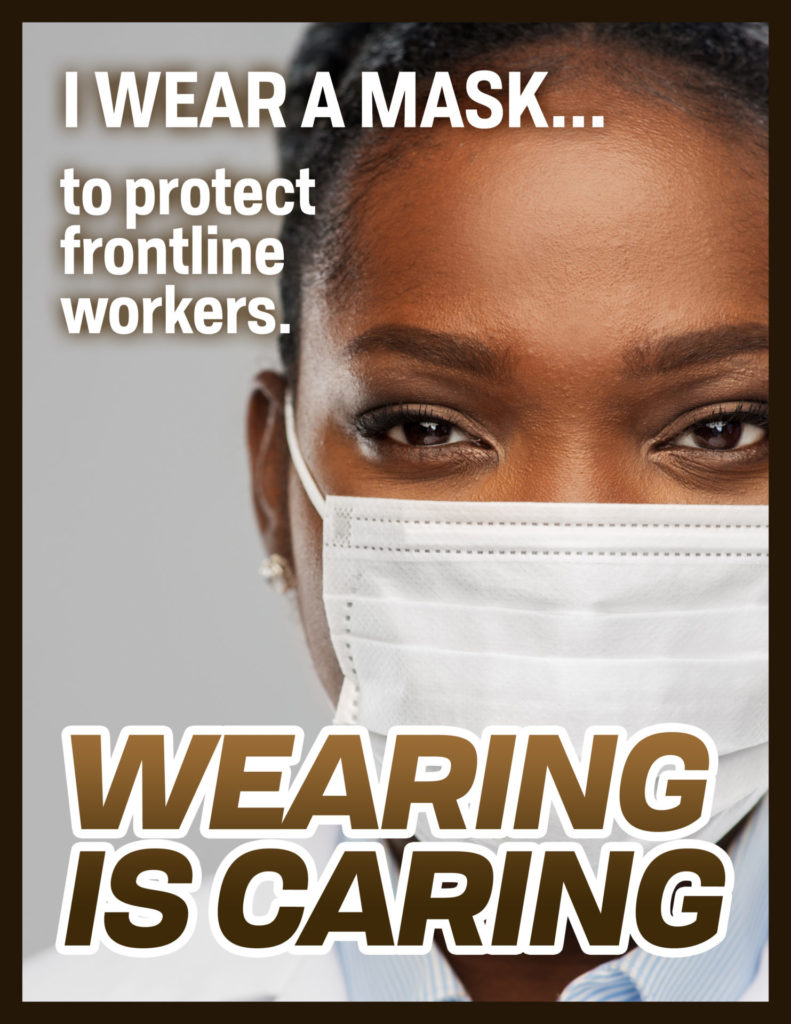
Mask Up Poster created by Wyoming State Library. Download this and other free posters from the Wyoming State Library website.
Welcome to the August 2020 edition of the Let’s Move in Libraries newsletter. This month we highlight:
- The importance of supporting ourselves during the COVID-19 pandemic
- How to foster a lifelong love of nature through library collections and programs
- Resources for starting a “library of things” focused on Healthy Eating and Active Living (HEAL)
- OCLC/WebJunction webinar on how libraries can help promote the multiple benefits of walking and walkable communities
In preparing this newsletter, we sent out a call for ideas to our Advisory Board. What we heard is that, in the context of the ongoing COVID-19 Pandemic, we need to prioritize supporting ourselves now more than ever. Our featured image this month comes from the Wyoming State Library. They write “Would you like some gentle reminders for your patrons to wear masks in your library building?” To respond to this need, they created six Mask Up posters that are free to download, print, circulate online, and otherwise use as you see fit to remind your community about the vital importance of slowing the spread of COVID-19.
Supporting ourselves during the pandemic
How can we support our health as we work to support Healthy Eating and Active Living (HEAL) through our libraries? Our Advisory Board members shared the following thoughts on this topic:
“[We need to] remind ourselves that things are difficult, and every little bit of help is important. I recently sent out a statement to libraries in my state saying it’s OK if things are different at your library right now. The result was overwhelming. I got so many replies from people thanking me for the letter and how they all felt like they were somehow failing because things were different.”
“Back in early July when our state numbers were looking pretty good, our library had planned on re-starting outdoor small group programming in August (e.g. walking book club, outdoor yoga, bike tour). But things really went downhill fast. We just had to make the call to cancel everything.”
“[Whatever you do] make sure that your programs are appropriately socially distanced. Know how to adjust at the last minute if standards change, and where to check for precautions during the pandemic.”
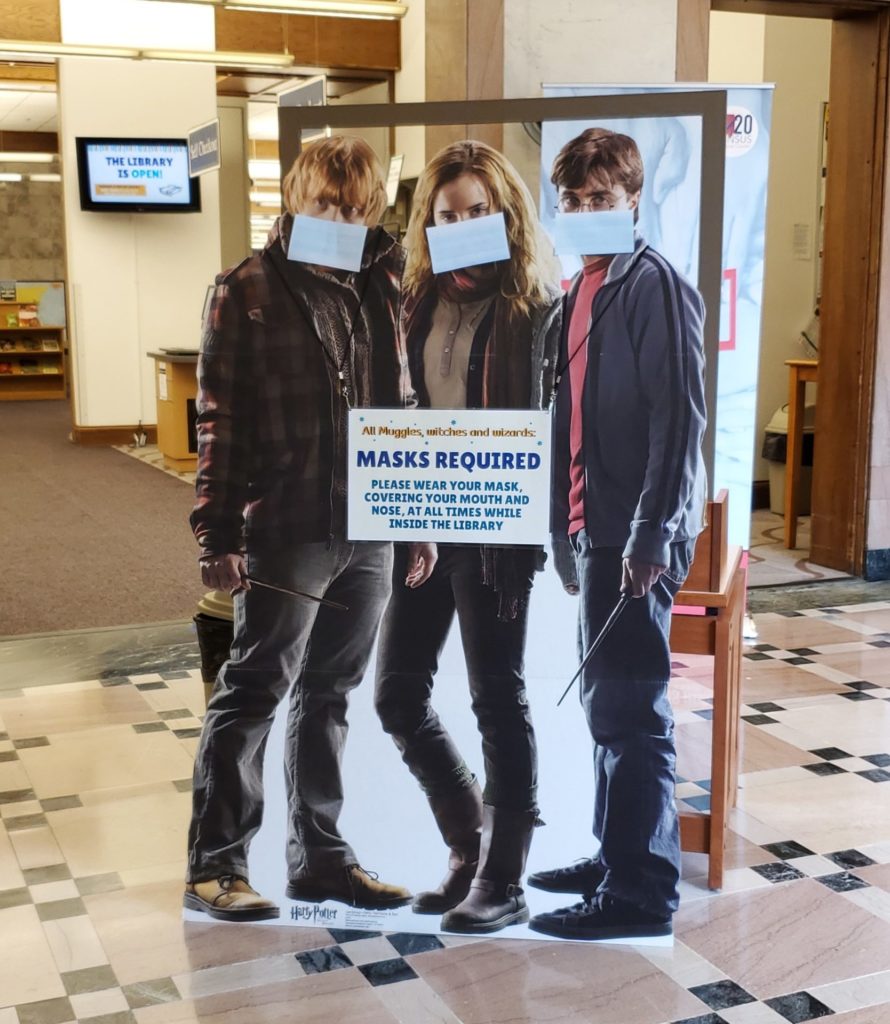
Illinois’ Joliet Public Library uses humor to remind patrons about the importance of mask wearing.
“I think focusing programming on the food chain supply, and its implications for public health in light of COVID-19, would be good. This could lead to lots of programming such as community gardens and nutrition/cooking classes.”
“I think it’s important to address mental health [at our libraries] by addressing the triad of body-mind-spirit. That’s what mental health professionals ask about when first assessing someone. They want to know if people are addressing their physical health needs through the right amount of exercise and healthy eating, their mental health needs through adequate social networks, managing stress, and enough intellectual stimulation, and spiritual health needs by practicing some kind of spirituality that feels right to the individual.”
1) Acknowledging that we’re in unprecedented times and celebrating whatever we’re able to do to help, including staying at home to stop the spread.
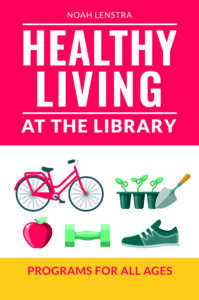 2) Helping our communities make sense of the unprecedented disruptions in our food systems and in our fitness systems (e.g. gym closures) by sharing information virtually about how these systems work, and how we can intervene in them by supporting things like community agriculture, or promoting ways to Move Your Way in everyday life, as the U.S. Department of Health calls it, among other things.
2) Helping our communities make sense of the unprecedented disruptions in our food systems and in our fitness systems (e.g. gym closures) by sharing information virtually about how these systems work, and how we can intervene in them by supporting things like community agriculture, or promoting ways to Move Your Way in everyday life, as the U.S. Department of Health calls it, among other things.
3) Acknowledging the stress that we are all experiencing, and not being afraid to reach out for help and to share our struggles. We recommend groups like Mindfulness for Librarians, Libraries are Champions of Healthy Communities, as well resources like those created or curated by members of our Advisory Board, including the free Yoga videos library director and researcher Jenn Carson recently recorded for the New Brunswick Public Library Service, accessible here. Go to Jenn Carson’s website to access more resources on self-care.
The webinars of the Greater Midwest Regional Library of the National Library of Medicine’s Kernel of Knowledge Series, which includes phenomenal videos, including “Library responses to COVID-19: Impacts on ongoing low-morale experiences,” “Introduction to Mindfulness: Nourishing Ourselves in These Times,” “Building Resilient Communities Online and In Person,” “Putting the Self back in Self-Care: Wellness in the time of COVID-19,” “Leading with Compassion during the COVID-19 Crisis.” Go to the Kernel of Knowledge Series webpage to access all of these resources.
The idea that we need to take care of ourselves to be able to take care of our communities is also a core component of the new book Healthy Living at the Library. Chapter 5 is entitled “Look Inward: Healthy Libraries Create Healthy Programs.” It focuses on how workplace wellness is an essential pre-requisite to library workers being able to work with partners to promote healthy eating and active living.
How are you finding inspiration and support during these difficult times? We’d love to hear from you!
Fostering a lifelong love of nature at the library
Along with the Children & Nature Network, we are very interested in how we can foster a lifelong love of nature at the library and using library resources. To that end, this month Advisory Board Member Kelly Senser generously shared her expertise on this topic. Kelly is a children’s services library assistant for Loudoun County Public Library in northern Virginia. Equal parts reader and nature explorer, she regards libraries and the great outdoors as treasured spaces to nurture one’s sense of wonder. Kelly worked at the National Wildlife Federation for 20 years and has been a certified Virginia Master Naturalist since 2015. She is passionate about gardening for wildlife and outdoor play.
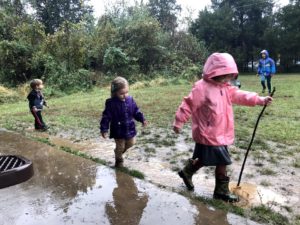
Rainy day play during Story Stroll program. Image courtesy: Loudoun County Public Library.
“A child’s world is fresh and new and beautiful, full of wonder and excitement. It is our misfortune that for most of us that clear-eyed vision, that true instinct for what is beautiful and awe-inspiring, is dimmed and even lost before we reach adulthood.” —Rachel Carson
This quote comes from The Sense of Wonder, a book I discovered in my teenage years and that remains one of my favorite nature reads. In my younger days, Carson’s vivid details of the outdoor adventures she enjoyed with her nephew intrigued me. When I became a parent, her prescription for keeping alive a child’s inborn sense of wonder resonated more. She writes, a child needs “the companionship of at least one adult who can share it, rediscovering with him [sic] the joy, excitement and mystery of the world we live in.”
Carson acknowledges that some adults feel ill-equipped to teach children about the natural world because they lack an understanding of it themselves. But Carson the scientist held this belief: It is not half so important to know as to feel. “If facts are the seeds that later produce knowledge and wisdom,” she writes, “then the emotions and impressions of the senses are the fertile soil in which the seeds must grow.”

Nature-based programming joy: A young patron excited to have found a snail in creek water sample. Image courtesy: Loudoun County Public Library
Studies confirm that by reducing stress, improving sleep, and delivering countless other benefits to our physical, mental, and social health, nature has the power to make kids—and adults—happier and more resilient. No matter your age, you can tap into the restorative benefits nature provides. It is these rewards—coupled with the opportunity to inspire the future stewards of our planet—that make fostering a connection with the natural world a worthwhile endeavor for librarians. Whether you’re a lifelong student of the great outdoors or a staffer who feels you lack the knowledge to host activities centered on nature exploration, a commitment to nurturing wonder is really all that’s needed, as resources to support discovery abound.
Consider the following resources as you get started:
Your library’s collection: It likely includes books and other media about wildlife and wild places, such as field guides, films, and natural history encyclopedias. Importantly (and conveniently!) these items hold answers to questions posed by curious minds. I frequently use picture books, both fiction and nonfiction, to introduce nature-themed sessions, as I find sharing a story a pleasant way to jumpstart the senses—listening and looking specifically—which are central components of discovery-making. Feel better with a road map? The Cornell Lab of Ornithology offers ideas for blending science and language literacy (sample topic here).
Online resources: Many local, state, and national organizations have already done the work of creating engaging nature-based activities. For a snapshot, check out this compilation produced by the North American Association for Environmental Education. It includes the offerings of government agencies, plant and animal societies, and other groups. (Titled “COVID-19: Resources, Tips, and Support,” the guide features tools useful in times of pandemic and beyond.) Consider tailoring an activity for your target audience.
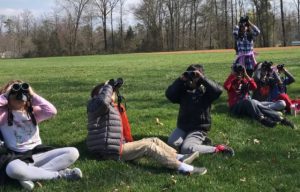
Kids bird-watching. Image courtesy: Loudoun County Public Library.
Community partners: Leaders of local nonprofits and representatives of our county’s soil and water conservation district, cooperative extension office, and parks and recreation department have been enthusiastic allies in my library system’s efforts to bring nature-based programming to our patrons. They have shared their knowledge and passion, loaned us education kits, and invited us to their green spaces to bring concepts such as wildlife-watching, planting for pollinators, citizen science, and StoryWalk® trails to life. These collaborations are a win-win-win: Partners generate awareness of their efforts on behalf of the environment; patrons gain access to expertise in the form of enriching content and new community links; and the library fortifies its role as a network weaver.
Mobile apps: Ready to venture outdoors with a group but uneasy about your ability to name the flora and fauna you see? Employ an app to help with identification. Dozens exist, and many are free. Fueled by recorded observations or image recognition technology, tools such as Merlin Bird ID, Creek Critters, and iNaturalist and its companion Seek serve up information about the plants and animals that participants may ask about.
The beauty of exploring nature is that you needn’t necessarily teach or explain at the get-go to pave the way for people, children in particular, to want to know more about the natural world. Stirring emotions and inviting people to tune in with their senses are worthy aims. “Once the emotions have been aroused—a sense of the beautiful, the excitement of the new and the unknown, a feeling of sympathy, pity, admiration or love—then we wish for knowledge about the object of our emotional response,” Carson writes. “Once found, it has lasting meaning.”
==
Additional resources on nature-based programming in public libraries
- Children & Nature Network / National League of Cities – Libraries as Nature Connectors Strategy Guide
- Our StoryWalk program guide
- Our gardening program guide
Resources for starting a “library of things” focused on Healthy Eating and Active Living (HEAL)
Last month, Let’s Move in Libraries director Noah Lenstra published “Coming soon to a library near you: A sharing culture” on the website of Shareable as part of their series on the Library of Things.
From immersion blenders to seeds to bicycles to nature backpacks, public libraries increasingly have in their collections three-dimensional objects that support healthy eating and active living.
One thing that we hear from many librarians is that they’d like to have these collections, but they have concerns about liability. What happens if someone borrows a bicycle and then injures themselves?
To help out, we’re thrilled to this month share a collection of liability waivers used by public libraries in Vermont. By having a patron sign a waiver of liability before borrowing these types of items, you help to protect your library again any possible legal liability.
Bike Share Waiver of Liability Form
Library of Things Borrowing Rules
Poultney Public Library Bicycle Lending Program Rules
Poultney Public Library Snowshoe Lending Program Rules
Does your library use similar forms? What types of Library of Things collections do you have to support healthy eating and/or active living? Let us know!
Learn about the multiple benefits of walking and walkable communities and how libraries can help
On October 22, 2020, OCLC/WebJunction hosts the free webinar “One Step at a Time: How Libraries Can Promote Healthy, Thriving, and Livable Communities.” The webinar will feature:
- Kate Kraft, Executive Director, America Walks
- Noah Lenstra, Director, Let’s Move in Libraries
- Mary Sizemore, Director, High Point Public Library (North Carolina)
- Jeffrey T. Davis, Branch Manager at San Diego Public Library and author, The Collection All Around: Sharing Our Cities, Towns, and Natural Places (ALA Editions, 2017)
This webinar will highlight the multiple benefits of walking and walkable communities and how libraries can help lead community efforts.
Go here to register for this free webinar, and to get more information about this learning opportunity. Let’s Move In Libraries has been highlighting how public libraries promote walking and walkable communities since it began in 2016. In 2019 we published the first peer-reviewed journal article on this topic. The article is open and access and completely free to download. Check it out at Lenstra, Noah, and Jenny Carlos. “Public libraries and walkable neighborhoods.” International journal of environmental research and public health 16.10 (2019): 1780. We also participated in an America Walks webinar on this topic in April 2020. Go here to watch the webinar recording to access all the resources shared about how public libraries can work with others in their community to promote walking and walkable communities.
Additional resources for HEAL programming at your library
 Did you know our logo is free to use? It’s true! We just ask that you share back what you do with it. We want to thank Atlanta’s Fulton County Library System for using our logo in their online virtual programming. Every week the Fulton County Library System offers online Let’s Move in Libraries programs, and to support this important work, the library system has purchased t-shirts and signage that library staff can use for this programming. You can check out the Fulton County Library System’s Let’s Move in Libraries programming on their Facebook channel to learn more about their efforts, and to get inspired to try something new with the Let’s Move in Libraries logo at your library.
Did you know our logo is free to use? It’s true! We just ask that you share back what you do with it. We want to thank Atlanta’s Fulton County Library System for using our logo in their online virtual programming. Every week the Fulton County Library System offers online Let’s Move in Libraries programs, and to support this important work, the library system has purchased t-shirts and signage that library staff can use for this programming. You can check out the Fulton County Library System’s Let’s Move in Libraries programming on their Facebook channel to learn more about their efforts, and to get inspired to try something new with the Let’s Move in Libraries logo at your library.
We’d love to thank the Fulton County Library System for continuing to offer great virtual programming during COVID-19. Advisory Board Member Christy Dyson reports that “We’re off and running with are Virtual Library Programming in the Fulton County Library System. We have several segments every day: Streaming story time, Fitness Tuesday (Let’s Move in Libraries), DIY Wednesday, Kitchen Chemistry for adults and teens as well as Zoom book clubs, books breaks and book reviews. I’m especially excited about Fitness Tuesday this allows us to use the let’s move platform extensively!”
Bring the logo to your library by downloading our logo and add it to your promotional materials. Just let us know how you use it! The easiest way is to tag us on social media.
During the October 2019 meetings of our Advisory Groups, we decided to re-launch our online group on Facebook. We invite you to join the 100+ librarians already in the group. This is YOUR SPACE to ask questions, get advice, share successes and challenges, and generally get the support you need to make a difference in your community. Consider joining us, and if you have a question about chair-based, StoryWalk(r), or gardening, or any other program that includes movement and physical activity, go ahead and ask it in this group!
Before the COVID-19 Pandemic, we had been featuring a different program idea each month, including music and movement, hands-on gardening, chair-based exercises, and StoryWalk(R). Check these out! We’ll be back with more featured programs in future newsletters, many of them focused on healthy eating! Please reach out with ideas for future featured programs at any point.
About Let’s Move in Libraries!
In our June 2020 newsletter, we announced a permanent expansion in the scope of Let’s Move in Libraries. Our project was inspired by Former First Lady Michelle Obama’s Let’s Move! initiative, which focused on supporting Healthy Eating and Active Living (HEAL) among Americans. Mrs. Obama worked to increase physical activity and nutrition through museums, with the support of the U.S. Institute of Museum & Library Services. We now align Let’s Move in Libraries even closer to Mrs. Obama’s original vision by supporting both physical activity and food based programming and partnerships in public libraries. More information on this expansion and the ideas behind it can be found in our revised About Page. We would love your feedback at any point!
Let us know if there are other innovative things you’re doing that we haven’t featured! We want to shine a light on all the ways librarians are getting the word out on the power of movement and healthy living in library programming. You are always invited to reach out and share with us. Please also reminder to share with us any news on programs you may be offering. We always love hearing from you! Tag us on social media or email news directly through our website. We’d love to hear from you!
Contact us and engage us on social media. We’re on Facebook, Instagram, Twitter, and YouTube. Sign up for our newsletter to get monthly news delivered right to your inbox.
Was this newsletter forwarded to you?
Subscribe to the monthly Let’s Move in Libraries newsletter for monthly editions of success stories, educational opportunities, and food for thought that will deepen the impact of movement-based programs and services in public libraries. The Let’s Move in Libraries project focuses on how public libraries create opportunities for individuals of all ages and abilities to engage in healthy physical activity.
